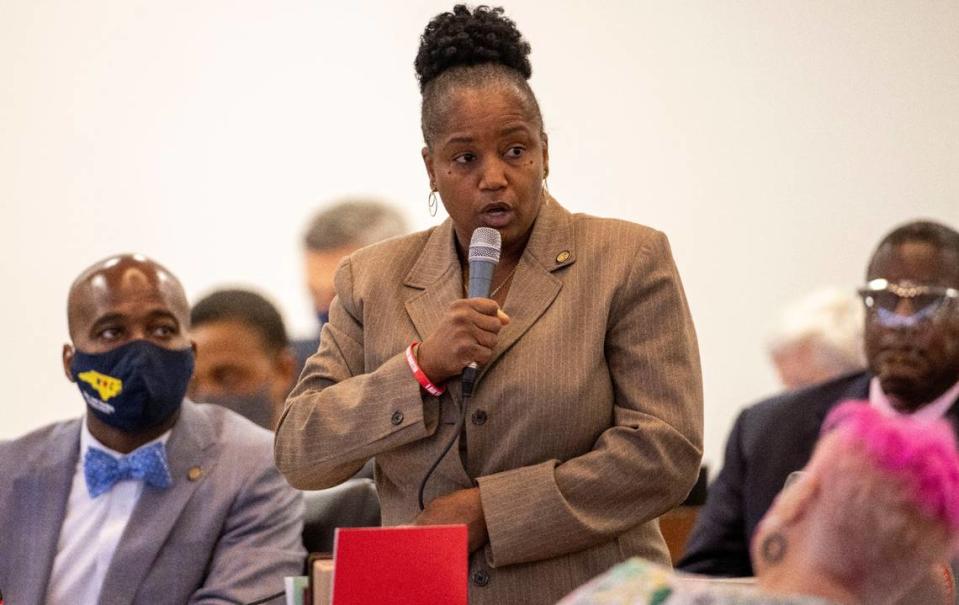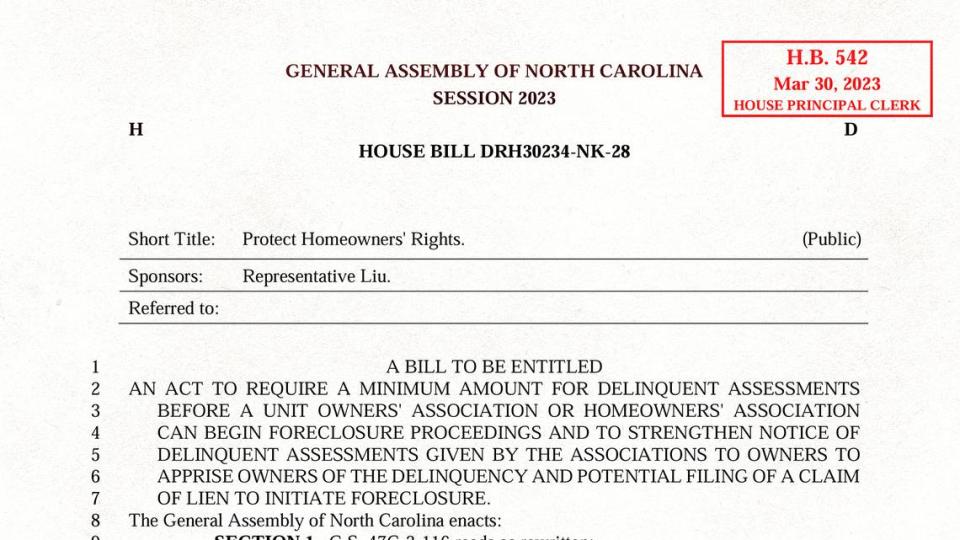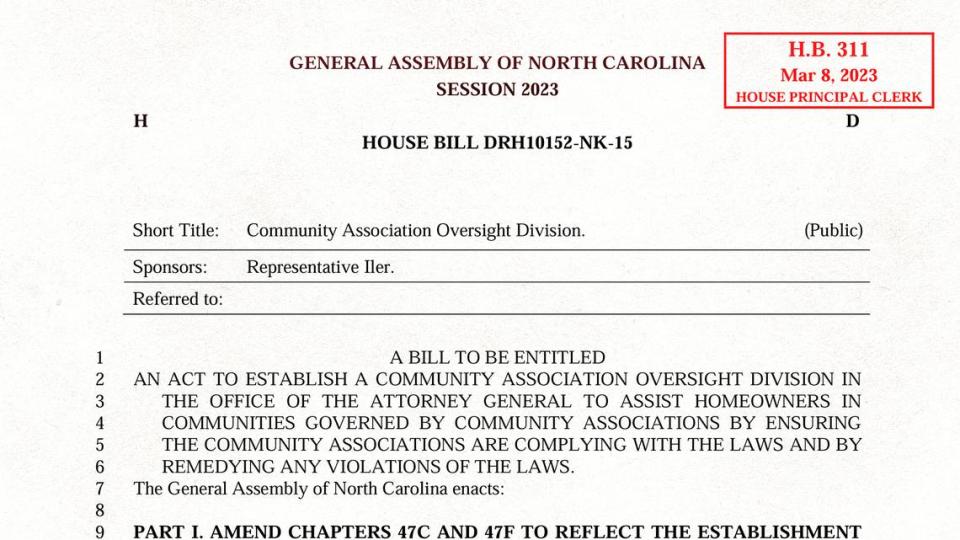When North Carolina HOAs want to block or pass legislation, they often get their way
North Carolina Sen. Kandie Smith was troubled by news reports of people who lost their homes over small HOA debts. So in March, the Pitt County Democrat introduced a bill to prohibit homeowners associations from foreclosing on homeowners.
Within a week, she received a visit from an attorney who represented HOAs and who argued that her bill was unnecessary because there were already precautions in place to protect homeowners, she said. Other lawmakers apparently agreed: Lawmakers never discussed Smith’s bill, she said. Instead it died in the Senate rules committee.
“The (HOA) lobbyists obviously are getting people’s ears,” Smith said.
Jim Slaughter, a Greensboro attorney who said his firm has represented thousands of HOAs, contends that North Carolina’s HOA laws provide plenty of protection for homeowners. Changing them, he argues, could “upset the apple cart” and inadvertently penalize people who are paying their dues.
Hopes Foreclosed
NC rules make it easy for HOAs to foreclose on homeowners. State law allows them to force the sale of homes for any amount of unpaid dues, no matter how small. Our investigation shows how often it's happening — and how it can be devastating to homeowners.
Hundreds in NC lose homes, equity after HOAs foreclose. Who protects homeowners?
Deceit, rigged bids and extortion: How HOA foreclosures can open the door to predators
‘Once. Twice. Sold for $4,400.’ How HOA foreclosure auctions cost owners their homes
Can an HOA sell your home? What NC law says, and how to challenge foreclosures
Charlotte HOA member learned the hard way: Fighting back can be a long, costly battle
When North Carolina HOAs want to block or pass legislation, they often get their way
“The current statutes are remarkably well balanced,” said Slaughter, a past president of the North Carolina Chapter of the Community Associations Institute (CAI), a group that advocates for HOAs statewide.
When HOAs weigh in on legislation that might affect them, critics say, one thing is clear: North Carolina lawmakers listen.

Protections removed from HOA bill
In a first-of-its-kind investigation, the Charlotte Observer and The News & Observer found that HOAs here have filed to foreclose in more than 5,500 cases since 2018, against owners of houses, condominiums and time shares. In more than 600 cases, owners lost their property or time-share stakes.
North Carolina rules make it easy for HOAs to foreclose in this state.
In the 2023 state legislative session, Democrats and Republicans introduced three bills to create more oversight for HOAs and to limit their ability to foreclose on homeowners. But all were either diluted, gutted or left to die.
House Bill 542 as originally drafted would have prevented HOAs from foreclosing on homes for debts of less than $2,500. This provision would have put North Carolina in line with several other states - including Georgia, California and Arizona - that have passed laws to prevent HOAs from foreclosing over tiny amounts.
A later version of the bill would have prohibited nonjudicial foreclosures, a relatively quick and easy way for HOAs to foreclose on homeowners. In nonjudicial foreclosures, HOAs get the approval to foreclose from a court clerk rather than a judge.
After appeals from the HOA lobby, those provisions were stripped away. In July and August, leaders of the HOA industry “vigorously pursued improvements to the legislation to minimize the damage” the bill would have done to associations, the industry’s legislative action committee reported.
The latest version of the bill no longer sets a minimum dollar amount for foreclosure and no longer bars nonjudicial foreclosures. But it would require HOAs to wait until an account is delinquent 180 days — twice the current waiting period — before moving to foreclose.

The initial version of House Bill 542 offered solid protections for homeowners, said Timothy Hinds, who leads the North Carolina Homeowner Association Law Reform Coalition.
“But it has been stripped down almost to the level of irrelevance,” said Hinds, whose group was formed about 12 years ago by people who were concerned about HOAs that were abusing their power.
The legislative action committee for the CAI’s North Carolina chapter has opposed even that pared-down iteration of the bill. After the Senate passed that version in September, the committee asked CAI members to urge House members to hold the bill for further study, the committee reported.
Soon afterward, the legislation was referred to a conference committee. Lawmakers could take it up again next year.
‘Zero oversight’
The same thing happened to House Bill 311, homeowner advocates say. Its original version would have set up a division within the state attorney general’s office to oversee HOAs. But after lobbying by CAI, the HOA advocacy group, that provision was removed from the bill.
“CAI just does not feel the AG’s office is an appropriate arm for oversight,” said Weldon Jones, the lobbyist for the CAI’s North Carolina chapter.
The resolution that was eventually adopted did not call for attorney general oversight. It merely set up a House committee to study HOA laws, remedies for HOA violations, and the agencies that would be best positioned to help homeowners resolve complaints.

Rep. Frank Iler, the Brunswick County Republican who introduced the bill, said he did so after hearing complaints that some homeowners associations were selectively enforcing rules.
HOAs, he said, “charge dues. They elect a board. And they enforce rules. It’s a local government in your neighborhood. But there’s zero oversight.”
But he said the attorney general’s office concluded that the existing statutes would give it little ability to enforce. And he said there was clearly not enough support in the legislature to pass his bill.
“You’ve got to count the votes sometimes,” he said.
Deja vu for homeowners
It’s not the first time state legislators appointed a committee to study North Carolina’s HOAs.
In 2011, a House select committee found there was a need for additional measures to protect homeowners from “abusive HOA practices,” such as arbitrary enforcement of rules, excessive fines and abuse of the foreclosure process. The committee concluded that there may be a need to “prohibit or limit the use of foreclosure in all or some cases.”
Legislators subsequently lengthened how long HOAs must wait to foreclose on homeowners for unpaid debts — from 30 to 90 days. And it required that HOA boards vote to authorize foreclosures.
But the legislature never prohibited or limited the use of foreclosures. And it never took other steps the committee recommended, such as allowing the imposition of punitive damages for HOAs that refuse to comply with consumer protection provisions.
“It’s a failure to act is the issue,” said Jim Lane, who founded what is now the Law Reform Coalition to try to strengthen North Carolina’s HOAs laws. “We don’t need another study group.”
In 2011, Lane planted a bed of pansies in a bare patch of ground in his Huntersville neighborhood. Saying he’d done so without permission, his HOA began fining him $100 a day and put a lien on his property.
That and other experiences with HOAs prompted Lane to begin lobbying for laws that would better serve homeowners in HOA communities.
“I looked at it as a problem to be solved - but very solvable if people came together,” said Lane, a leadership consultant who moved to Georgia in 2018 but still monitors HOA issues in North Carolina and other states. “But then I came to realize: There were too many people trying to protect their own interests.”
In 2022, the group that advocates for North Carolina’s HOAs used its newsletter to tout what it called a “Major Legislative Win to Protect NC Association Rights.”
Its article noted the passage of a law — championed by the group’s legislative action committee — that prevents older homeowner and condominium associations from losing power. The committee’s effort followed two state Court of Appeals rulings in 2021 that cast doubt on whether older HOAs would retain the right to enforce architectural rules and collect dues.
The group celebrated its success. “North Carolina is a model for how to get things done on the legislative stage that is both strategic and inclusive,” the article reads.
Lane, the founder of the North Carolina reform group, has a different take.
“The HOAs have total clout,” he added. “Homeowners have no power.”

